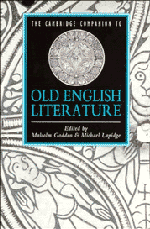Book contents
- Frontmatter
- 1 Anglo-Saxon society and its literature
- 2 The Old English language
- 3 The nature of Old English verse
- 4 The nature of Old English prose
- 5 Germanic legend in Old English literature
- 6 Heroic values and Christian ethics
- 7 Pagan survivals and popular belief
- 8 Beowulf
- 9 Fatalism and the millennium
- 10 Perceptions of transience
- 11 Perceptions of eternity
- 12 Biblical literature
- 13 Biblical literature
- 14 The saintly life in Anglo-Saxon England
- 15 The world of Anglo-Saxon learning
- Further reading
- Index
- Series List
7 - Pagan survivals and popular belief
Published online by Cambridge University Press: 28 May 2006
- Frontmatter
- 1 Anglo-Saxon society and its literature
- 2 The Old English language
- 3 The nature of Old English verse
- 4 The nature of Old English prose
- 5 Germanic legend in Old English literature
- 6 Heroic values and Christian ethics
- 7 Pagan survivals and popular belief
- 8 Beowulf
- 9 Fatalism and the millennium
- 10 Perceptions of transience
- 11 Perceptions of eternity
- 12 Biblical literature
- 13 Biblical literature
- 14 The saintly life in Anglo-Saxon England
- 15 The world of Anglo-Saxon learning
- Further reading
- Index
- Series List
Summary
Bede tells the story of the conversion of the pagan English with lively detail and predictable bias in the first half of his Ecclesiastical History, For Bede, as for the sixth-century British historian Gildas, on whose writings he leans, the Angles and Saxons were invited to mid-fifth-century Britain as mercenaries who then turned against their Romano-British employers. Bede refers to them bluntly as 'pagans', 'heathen conquerors' and 'the enemy'. On the other hand, he is careful not to direct sympathy towards the Christian Britons, whose heart-wrenching miseries at the hands of the Saxons he paints with equanimity, assuring his readers that 'the fires kindled by the pagans proved to be God's just punishment on the sins of the nation'. Having characterized the main parties in this warfare as equally corrupt, whether through rapacity or inner depravity, Bede proceeds to introduce the heroes of his tale. These are St Gregory's Roman missionaries, together with the enlightened English rulers who accepted their teachings.
- Type
- Chapter
- Information
- The Cambridge Companion to Old English Literature , pp. 126 - 141Publisher: Cambridge University PressPrint publication year: 1991
- 5
- Cited by

